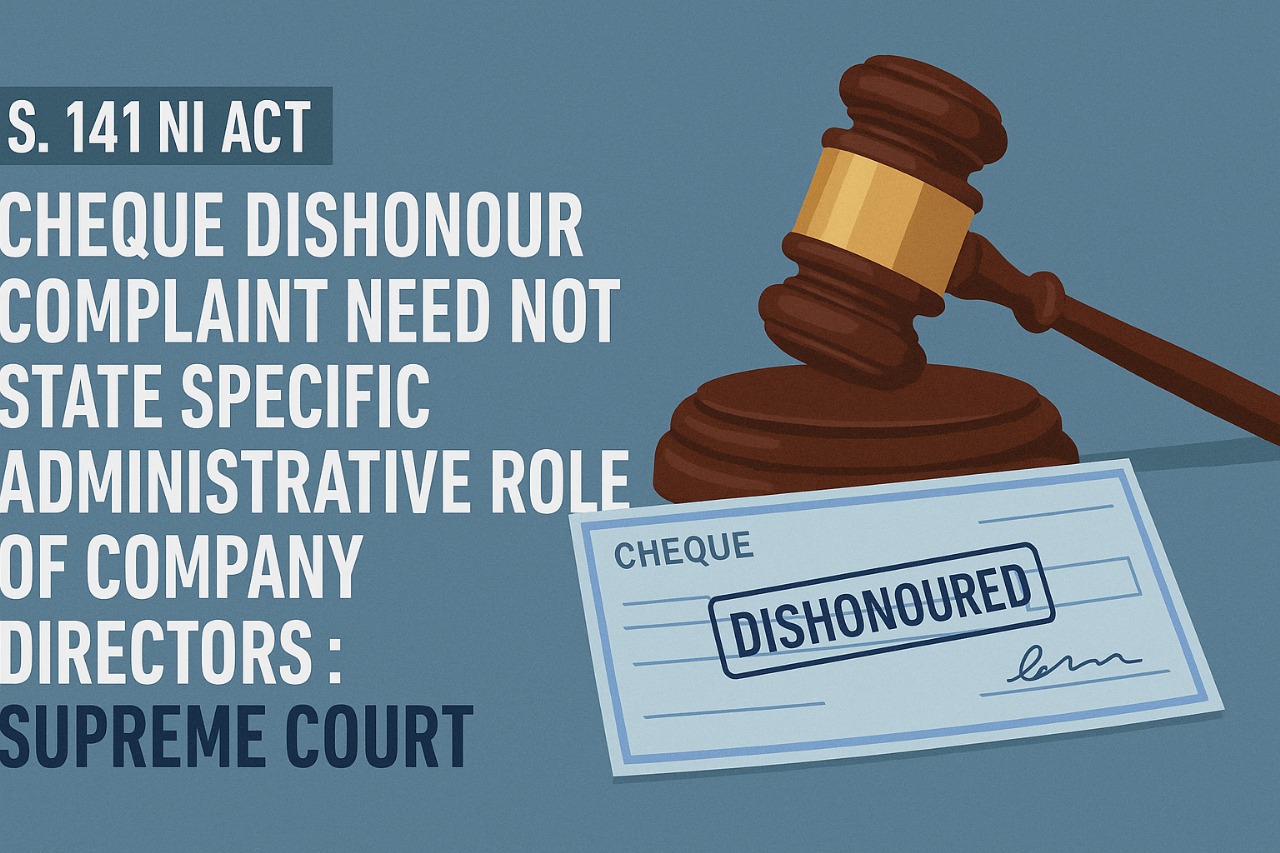The recent Supreme Court decision in HDFC Bank Ltd. v. State of Maharashtra (2025) significantly eases the pleading burden in Section 141 NI Act complaints. In a cheque dishonour case against a company and its directors, the Court held that a complainant need not repeat the exact statutory phrase “in charge of, and responsible for” when alleging a director’s role. Instead, it is enough that the complaint, read as a whole, shows the director managed the company’s affairs. A Bench of Justices Manoj Misra and K.V. Viswanathan set aside the Bombay High Court’s quashing of the complaint, reinstating the trial court’s summons.
Background of the Case
HDFC Bank granted a revolving credit facility to M/s R Square Shri Sai Baba Abhikaran Pvt. Ltd., whose directors were Mrs. Ranjana Sharma, her daughter Ms. Rachana Sharma, and Mr. Rakesh Rajpal. The company defaulted on repayments, and its account was classified as a Non-Performing Asset. A post-dated company cheque for ₹6,02,04,217 was dishonoured with the remark “account blocked”. After sending statutory notices under the NI Act, the bank filed a criminal complaint under Section 138 against the company and its directors. The trial court issued a warrant against all the accused.
The dispute centred on director liability under Section 141, which extends punishment to any company officer “in charge of, and responsible for, the conduct of the company’s business” at the time of the offence. Mrs. Sharma (who did not sign the cheque) was alleged to be “responsible for the company’s day-to-day affairs, management and working”, but the complaint did not use the precise statutory phrasing. The Bombay High Court (10 January 2024) quashed proceedings against Mrs. Sharma, finding the complaint lacked specific averments of her management role. The High Court noted the complaint did not include the exact words “was in charge of” or “was responsible to the company for the conduct of its business,” which it viewed as necessary under Section 141. Aggrieved, HDFC Bank filed a Special Leave Petition in the Supreme Court.
Supreme Court Ruling Summary
Supreme Court of India, New Delhi. The Supreme Court bench (Justices Misra and Viswanathan) allowed HDFC Bank’s appeal on 22 May 2025. Writing for the Court, Justice Viswanathan explained that Section 141(1) indeed requires alleging that a director was “in charge of and responsible for” the company’s business, but “repetition of the exact words of the Section in the same order… is not the mandate of the law.” In other words, a complaint need not mechanically parrot the statute: material compliance is enough if the director’s role is reasonably alleged.
The Court observed that information about each director’s exact functions lies in the company’s and directors’ exclusive knowledge. It is therefore up to the directors to prove they were not responsible for company affairs, rather than for the complainant to plead those details. In this case, the complaint stated that Mrs. Sharma was “responsible for the company’s day-to-day affairs, management and working”. The Supreme Court held that these averments and annexed board resolutions satisfied Section 141’s requirements. Accordingly, the Court set aside the High Court’s order and reinstated the summons against Mrs. Sharma.
Legal Analysis: Impact on Section 141 Interpretation
This ruling reinforces a substance-over-form approach under Section 141. The Court emphasised that Section 141’s twin elements (being “in charge of” and “responsible for” the company’s business) must be factually met, but need not be stated verbatim in the complaint. As the Court explained, “[t]he complaint is supposed to know only generally as to who is in charge of the affairs of the company”, and detailed administrative aspects are within the directors’ special knowledge.
- No automatic liability for title alone. The Court reiterated that being a director by designation does not create prima facie guilt. Section 141 liability is “vicarious” and strict: only those directors who participated in the contested transaction or oversaw the company’s business at the time can be held liable. It cited that “not every person connected with a company is made liable” under Section 141. Mere signing authority or board attendance, without more, will not suffice.
- Complaint-stage burden. Complainants must include enough factual averments to raise a prima facie case of a director’s involvement. The Court clarified that a general allegation (e.g. “in charge of day-to-day affairs”) is sufficient at this stage. The magistrate must ensure the complaint has “sufficient and substantive averments,” but it is not a trial of truth. Any gaps (such as the director’s lack of knowledge) can be explored during the trial under the proviso of Section 141. Once a complaint plausibly implicates a director in management, the burden effectively shifts: the director must later demonstrate non-involvement.
- Clarity for pleading. The decision removes a trap for complainants whose rigid wording requirements may otherwise trip them up. The Court reduces dismissals of NI Act cases on technicalities by allowing varied phrasing (so long as the role is conveyed). Practically, bankers and counsel can focus on alleging a director’s responsibility in substance. Conversely, companies should ensure that director duties are documented, since broad language in a complaint (backed by board resolutions) may suffice to reach trial.
The ruling confirms that Section 141 liability hinges on absolute control of corporate affairs. This preserves the vicarious nature of the offence while guarding against undue procedural formalism. One commentary notes that the Court “upholds the principles of justice and accountability” by ensuring genuinely responsible directors can be held accountable.
Case Law Comparison
The judgment revisits and harmonises the Supreme Court’s past Section 141 jurisprudence:
- SMS Pharmaceuticals Ltd. v. Neeta Bhalla & Anr. (2005): Held that a complaint must aver the accused was “in charge of and responsible” for the company’s business when the offence occurred, and that mere directorship is not enough. The Court in the present case reaffirmed these fundamentals.
- K.K. Ahuja v. V.K. Vora & Anr. (2009): Held that a general averment suffices; the precise statutory words need not be fully used. This principle underlies the 2025 ruling.
- National Small Industries Corpn. Ltd. v. Paintal (2010): Emphasised clear, specific pleading of directors’ roles, suggesting stricter phrasing. The new judgment effectively limits Paintal, indicating that strict formality is not required if the complaint otherwise demonstrates a director’s control.
- S.P. Mani & Mohan Dairy v. Snehalatha Elangovan (2022): Reiterated that a complainant needs only to plead who was in charge generally. The 2025 decision follows Mani closely, holding that there is “no obligation on the complainant to plead…matters which are especially within the knowledge of the company or the directors”.
- Monaben Ketanbhai Shah & Anr. v. State of Gujarat (2004): An earlier case that similarly noted that the complaint need not reproduce Section 141 verbatim if the substance of the claim is met. The current ruling echoes this logic.
In sum, the HDFC Bank judgment aligns with SMS and Ahuja/Mani to ease pleading standards, while ensuring the core test of directorial involvement remains intact. It marks a clear preference for substantive allegations over technical compliance.
Commentary and Expert Views
Legal analysts have praised the decision as providing “much-needed clarity” on directors’ liability. A commentary notes that, emphasising substance over exact words, the Court “reaffirmed the importance of ensuring that directors and persons in charge of companies are held accountable”. Similarly, industry observers highlight that the ruling will prevent lower courts from prematurely quashing complaints on hyper-technical grounds.
One seasoned practitioner commented that the Court has adopted a “substance-over-form” standard: a complaint must only convey that the director managed the company, rather than mechanically quoting the statute. This pragmatic approach was viewed as balancing the interests of creditors (by preserving genuine claims) with directors’ rights (by not attributing liability absent apparent involvement). No contrary bar association statements are on record, but the consensus in legal circles is that the apex court has struck a fair middle path.
Conclusion
The pivotal takeaways for practitioners and establishments are:
- For Complainants: When framing a Section 138/141 complaint, clearly allege each director’s role in managing the company. Use substantive descriptions (e.g. “oversaw day-to-day operations” or attach board resolutions) rather than rote statutory language. This will satisfy Section 141’s trigger and survive initial scrutiny.
- For Directors/Companies: Don’t assume directorship alone spells liability. Directors may defend themselves by showing a lack of involvement in the transaction. However, vague or sweeping language in company records can backfire. It is prudent to document the distinct roles of executives and ensure only truly involved individuals sign cheques.
- For Courts: The ruling directs trial courts not to demand a “magic incantation” of words. Preliminary quash petitions should affect every reasonable inference of an accused’s responsibility. Issues like actual knowledge or negligence can be left for trial after evidence is led.
- Future Precedent: This judgment will guide lower courts to interpret pleadings under Section 141 liberally. It may reduce litigation over technical defects, focusing on the core question: who managed the firm at the time of the dishonoured cheque?
The Supreme Court has clarified that Section 141 complaints should be assessed on their substance. By doing so, the Court ensures that only those company officers who genuinely managed the business can be criminally prosecuted for a bounced cheque, a result that both creditors and honest directors can respect.
About the Author
Ruhan Deb is a third-year law student at Symbiosis Law School, Noida. He is keenly interested in litigation, focusing on Criminal Law and Competition Law. Beyond the legal realm, Ruhan is passionate about global politics and history, complementing his analytical approach to legal studies. His multidisciplinary interests reflect a commitment to understanding law in broader social and geopolitical contexts.

